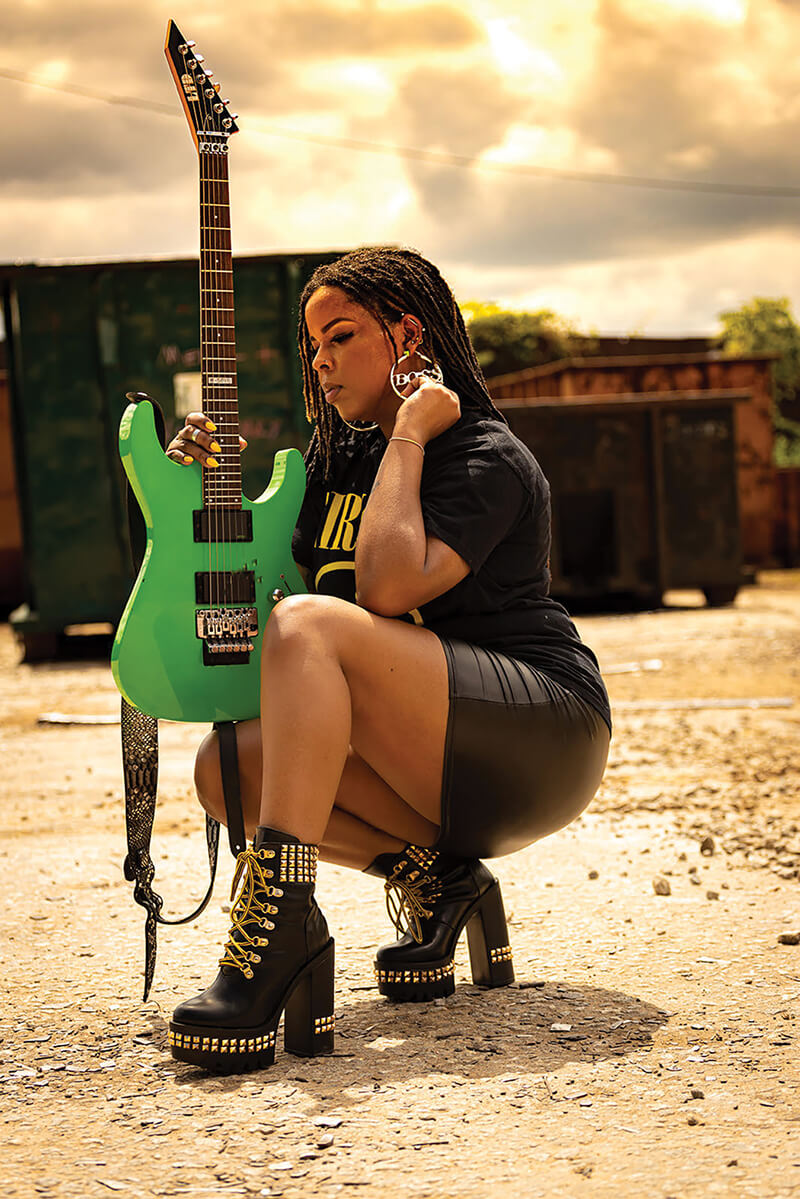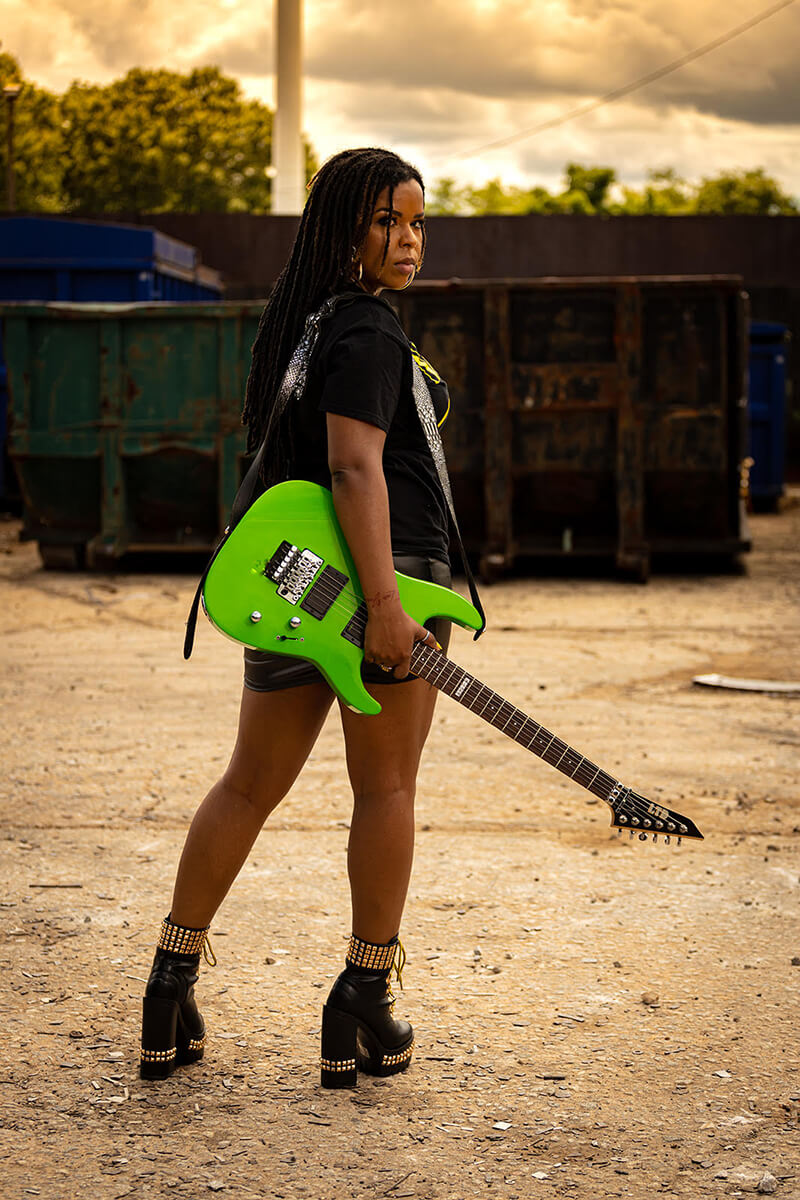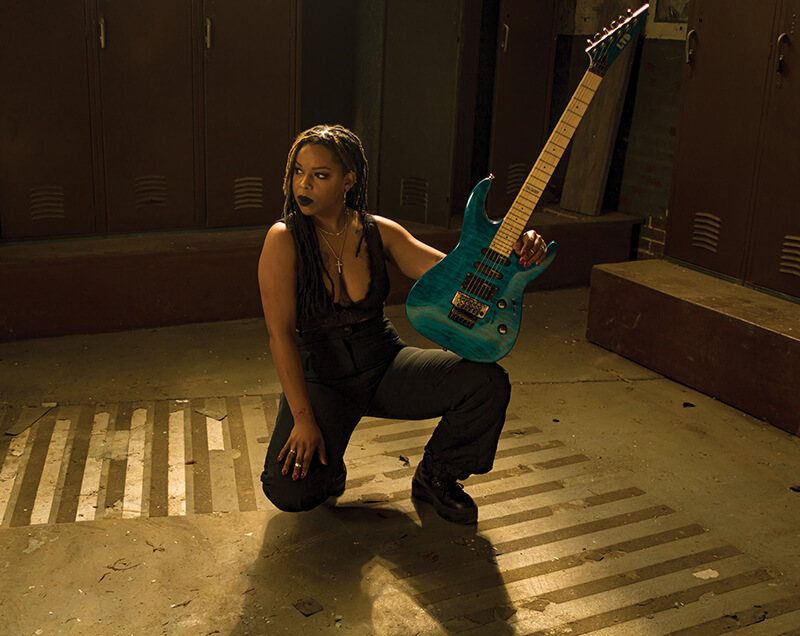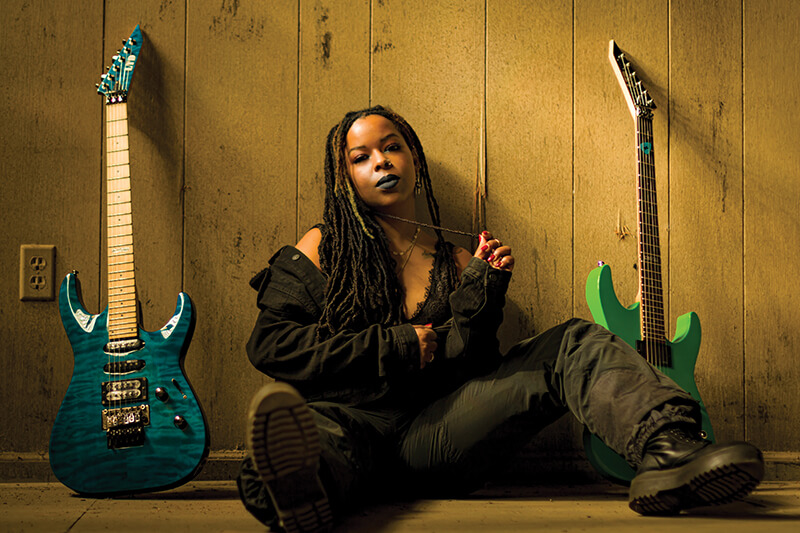ATL Shredder Guitar Gabby on Getting a Law Degree, Empowering Black Female Artists and Surviving a Global Pandemic
Guitar Gabby is a fierce axe-wielder, an Atlanta native who’s been busy getting a law degree, and a driving force in empowering Black female artists in the music industry. In what little downtime she has, she graciously sat down with us to discuss her career, her guitar influences, her band and her general bad-assery.
For the complete interview, give a listen to our new podcast, Performer: On Record Episode 2…

Where did Guitar Gabby come from?
I grew up between Atlanta and Washington, DC. My mom is from DC, she moved down here to go to Spelman College, which I would later attend. And then my dad is from Atlanta, and he did over 35 years in law enforcement here, as did my grandfather with the city of Atlanta…in a family of very educated people, not just in the arts and education but with the law and law enforcement.
When I started playing music, I was about 13 years old, well I was playing music before then. My mom started me on piano and a couple of other instruments — I played the clarinet but guitar is what really spoke to me. My mom bought me my first guitar when I was 13, and I taught myself how to play.
I took my first real steps into the music industry my first year of college, which was 2010. And I started my own band, it was called Bye Bye Love [after the Cars song]. I started learning the industry from there. Prior to that, [my parents] were very keen on making sure my sisters and I were educated and understood what we wanted to get into, understood the industry and business behind that. So, my dad had me read a lot of copyright things and learn how to copyright my music from a very young age. And then I eventually went to Spelman College, got a lot of knowledge about the law, not only in environmental science, but also music.
Shortly after that, I went to Vermont Law School, and graduated in 2018, and I am where I am now.
Was the goal of going to law school to practice law, or for you to have a better foothold on managing the careers of the artists you worked with? Or both?
A little bit of both. A lot of people look at law and lawyers in this one-dimensional [framework]… and say that if you are a lawyer that you are a practicing attorney in the courtroom every day arguing with people. But that’s not how it is, and my passion, which is what fueled me to go to law school, was to educate people. I realized from my experience that a lot of artists were not aware of things like copyright, trademark or any arena of intellectual property. And knowing how to apply that to yourself.
A couple of areas where a lot of artists struggle are understanding the business behind their art and the talent that they have. I knew that it wasn’t enough to be talented in the industry, you have to understand the business if you want longevity. That really is the key…and being involved in it in any capacity.
I do a lot of courses now where I teach people self-management and simple things in regards to taxes and contracting, not just for adults but for [younger artists] as well.

So, let’s take it back. I want to know what 13-year-old Gabby is playing when she gets her first guitar. And what kind of guitar was it?
Oooh, it was a really old Johnson Stratocaster-type guitar. It was a really crappy guitar (laughs). I am the biggest Nirvana fan, I listened to a lot of Nirvana and a punk bands, like TAT is one of my favorite bands — they’re a London punk band. But I used to just listen to a lot of random punk and grunge and replicate what I was hearing.
Did you take traditional lessons or were you more self-taught?
I was mostly self-taught for the first three years. When I got to my fourth year, I started training classically with a teacher that used to work in my church. I studied classical with him for two or three years, and that’s really where the world of music theory made sense to me. If I can understand the “why” behind the “what” it’s easier for me to apply to how I do it.
Were you writing at that time?
I was always writing music…I think that’s why my parents got me into piano. They thought it would help me play the music I was hearing in my head.
Fast-forward to today, and you’ve got the band together, the TxLips. That started in 2016, right?
Right. I used to play for Diamond, who was a rapper from Atlanta, and I did a couple music videos [with her]. And I realized that she needed a backing band in Atlanta, because she had one in LA. So, I started the band and managed [them] because I quickly realized people who aren’t musicians don’t know how to manage musicians. And if you do, it’s a very special skill set – not everybody has it.
I started my management journey there, and then simultaneously started the TxLips. We were really busy almost every night of the week either in rehearsals or doing shows, just to get the name out there. The reason I started it, outside of Diamond needing a band, was because I realized that there’s a very large gap in the music industry that needs to be filled by Black women’s voices and our images being involved in marketing, being on panels, being on the business side, the legal side.

We’re not as present as I believe we should be, so I wanted to create a platform for Black women to be able to participate in music, whenever they wanted, however they wanted.
The band is a collective; there is no set four people. I subcontract musicians from around the world to play with me whenever I tour. So, I have musicians in Canada, London, all throughout the Southeast region, the West Coast, the Midwest, there are musicians everywhere. And the joy of it is they all bring a different style to the table, a different background, and when we get on stage together and I hear how they express the music I’ve written…it’s really a beautiful thing.
I think what’s unique about your playing style is that there’s a really great melodic aspect, especially in your leads. Where did that come from?
Some of my biggest influences I didn’t really learn about until I got to college and learned the history of Black people creating rock n roll and many other genres. Sister Rosetta Tharpe is one of my biggest influences, not just her style of playing but her courage that I can relate to as a Black woman. We’re usually at the bottom of the totem pole in a lot of different industries, especially in music.
What I’ve experienced, when I walk into a room, you’re placed in one of a few limiting categories…so I knew it had to have been hard for her to walk in [to a room] with as much confidence as I see in her videos. It empowers me; she’s one of my biggest influences for those reasons.
I also really love Steve Vai, Joe Satriani…I really love Jimi Hendrix and Orianthi…
I’ve seen you play a number of really cool ESP/LTD guitars. Are you an official endorser at this point?
Yeah, I’ve been with them for about three and a half years or so. It’s great, they’re really good people. It ties in a little with what I was saying earlier, with regards to Black women being represented in music…not just on a performance level. Something I’ve been working with them on is diversity and inclusion from a marketing perspective. Because I don’t see Black people on their marketing as much, but that’s a conversation we’ve been having, and they’re good people. And I wouldn’t want to endorse anyone else.
With all that’s going on in the world now, are you doing OK? Where do you see yourself headed if touring opens up again?
Honestly, I was on a panel and this was a part of a conversation we were having – the return of live music – if at all, what is that going to look like? One of the things I was saying was…I don’t necessarily feel comfortable entrusting my health and my band’s health to a venue who hasn’t taken necessary precautions to test people or keep people socially distanced. Plus, it’s really difficult to control humans and to keep them distanced, especially when half of the people in this country think it’s a hoax, but I think that it’s gonna be interesting…
For me, I see myself and my band doing what we’re doing now, existing in a virtual capacity, and just being available for people from an educational aspect and also from a performance aspect.
Follow on Instagram @guitargabby

